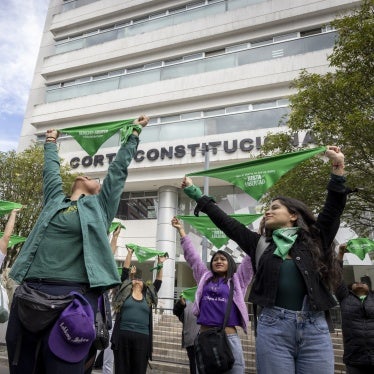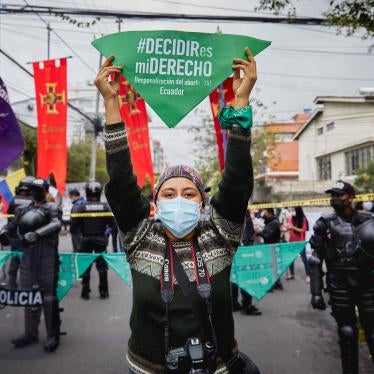Señora Magister Midori Musme Cristina De Habich
Ministerio de Salud (MINSA)
April 11, 2014
H.E. Minister De Habich:
We write to welcome your recent statements to Congress and to the press that the ministry will adopt a national technical guide on legal abortion to save the life or preserve the health of a pregnant woman by July 2014. The Peruvian government has been discussing such a guide since 2006, and Peruvian organizations, UN agencies, and international experts have repeatedly called for it. By moving quickly to adopt the technical guide, the Peruvian government will be taking an important step toward ensuring that women’s health and rights are protected.
Over the past seven years, Human Rights Watch has published several reports on Latin American and Caribbean countries focusing on the impact of laws and practices that restrict women’s access to comprehensive reproductive health services, including safe and legal abortion. We have consistently found that excessive restrictions on accessing abortion create an environment where women turn to unsafe and clandestine procedures that can threaten their health and lives. We have also found that clear protocols and guides are extremely important for ensuring that health care professionals, government officials, and individual women understand the criteria and processes for accessing legal abortion services.
In a 2008 report, Human Rights Watch documented the impact of the absence of a national protocol or technical guide on abortions to preserve the health or life of women and girls in Peru. We interviewed health care providers, individual women, and officials, and found that, despite the removal in 1924 of criminal penalties for abortions when a woman’s health or life are at risk, the absence of a national protocol or guide created normative vacuums in the health system that made access to legal abortion services difficult or impossible, in clear violation of national and international law.
In our report, we found that the lack of information on the exemption from criminal penalties for abortions to preserve women’s health or life and the absence of clear eligibility guidelines created a barrier for individuals seeking these services. As a result, women and adolescents we interviewed in Peru said they turned to unsafe and illegal procedures that could endanger their lives and health. Moreover, health care practitioners told us that they were reluctant or unwilling to perform legal abortion procedures without greater clarity from an official protocol. We found that some doctors failed to provide their patients with adequate medical treatment because they feared prosecution or other sanctioning due to unpredictable administrative approval procedures and confusion about the legal exceptions to the criminalization of abortion.
Since then, research by experts and organizations working on health care and women’s rights in Peru has shown that the absence of a national protocol or technical guide continues to have a negative impact on women and girls in Peru. Several organizations related to health or rights are calling for the adoption of a national guide (in some cases referring to the document as a “protocol,” but referring to the same content), including the Medical College of Peru. The Peruvian Society of Obstetrics and Gynecology has expressed the need for a guide or protocol in various statements since 2003. Eleven professional schools in the Arequipa region, led by the Bar Association, made similar statements in 2009. The Human Rights Ombudsman has also made public statements calling for a guide or protocol since 2005. In 2013, the Ministry of Women and Vulnerable Populations and the Ministry of Justice and Human Rights released technical reports signaling the need for and the obligation the state had to approve the guide.
Peru is a state party to international treaties protecting the human rights of women and girls. A number of treaty bodies, including those responsible for monitoring implementation of the International Covenant on Civil and Political Rights (ICCPR), the International Covenant on Economic, Social and Cultural Rights (ICESCR), the United Nations Convention against Torture (CAT), and the Convention on the Elimination of All Forms of Discrimination against Women (CEDAW), have found that undue restrictions on therapeutic abortion may violate a woman or girl’s rights to life, health, non-discrimination, privacy and ability to decide on the number and spacing of children, information, and freedom from cruel, inhuman or degrading treatment. The UN special rapporteur on the right to health has called for the decriminalization of abortion in general, and has urged governments to establish policies and programs in line with World Health Organization protocols and to ensure that health-care providers are fully aware of the law related to abortion and its exceptions.
Following the K.L. v. Peru (United Nations’ Human Rights Committee, 2005) and L.C. v. Peru (CEDAW Committee, 2009) cases, both concerning the denial of therapeutic abortion as a violation of human rights, UN treaty bodies (committees of experts charged with monitoring countries’ implementation of treaties) have consistently urged Peru to take steps to ensure that similar violations do not occur in the future. In 2012, for example, the Committee on Economic, Social and Cultural Rights expressed its concern “that the conditions under which therapeutic abortions can be performed are not nationally regulated” and called on Peru to “establish a domestic protocol for the performance of therapeutic abortions.” Although we commend the Peruvian government for submitting reports to UN human rights treaty bodies, none of Peru’s reports have convincingly described meaningful measures to ensure non-repetition of the violations. By adopting a technical guide on abortions to save the life or preserve the health of a woman, Peru will have taken a vital step toward meeting its international obligations to fulfill the right to health and other rights.
Human Rights Watch joins with Peruvian organizations and international experts in urging the Ministry of Health to ensure that the technical guide to be adopted has clear procedures to ensure that women can access legal abortions without delay. The guide should include the eligibility criteria to practice a legal abortion, the techniques and medical procedures to use, procedural timelines by which medical professionals must act, and clear delineation of decision-making authority within health facilities. Such standardized directives would enable doctors and other health professionals to provide quality, legal medical care to their patients without fear of prosecution. It would further empower women and girls to seek and receive information and adequate medical care, as is their right.
We are encouraged by your commitment to have the technical guide be adopted in the first half of the year. Toward that end, we believe it is very important that the most current version of the proposed technical guide be made available for public comment without delay. Any delays in adopting and implementing the technical guide will perpetuate the uncertainty and risks facing women in need of abortions to preserve their health or save their life.
We thank you for your attention to this important matter.
Yours truly,
Liesl Gerntholtz
Director
Women’s Rights Division








